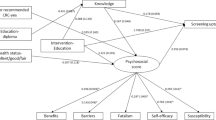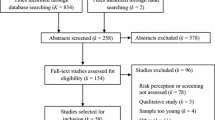Abstract
Colorectal cancer (CRC) screening is underused in the United States, and non-adherence with screening recommendations is high in some populations. This study describes the characteristics of people who have never been screened for CRC. In addition, we use the health belief model to examine the constructs associated with screening behavior. We used data from the 2010 Behavioral Risk Factor Surveillance System (BRFSS) to create three study outcomes: people who have been screened for CRC and are up-to-date with current recommendations, people who have been screened but are not up-to-date, and people who have never been screened. We used multivariate logistic regression modeling to calculate predicted marginal estimates examining the associations between the screening outcomes and demographic and Health Belief Model (HBM) characteristics. Overall 29 % of respondents had never been screened for CRC. In the adjusted model, 36.6 % of US adults age 50–59 years and 29.1 % of US men reported never being screened for CRC. More Asian/Native Hawaiian/Pacific Islander, non-Hispanics (38.2 %) reported never being screened than members of other racial and ethnic groups. Nearly 37 % of people with less than a high school diploma reported never being screened. We found statistically significant differences among screening outcomes for all demographics and HBM constructs except could not see a doctor because of costs in the last 12 months, where approximately 29 % reported no CRC screening. New interventions should focus on those subpopulations that have never been screened for CRC.
Similar content being viewed by others
References
United States Cancer Statistics Workgroup. United States Cancer Statistics: 1999–2007 Incidence and mortality web-BASED report. Atlanta. 2010. www.cdc.gov/uscs.
Centers for Disease Control and Prevention. (2011). Vital Signs: colorectal cancer screening, incidence, and mortality-United States, 2002–2010. MMWR Morbidity Mortality Weekly Report, 60(26), 884–889.
Jemal, A., Siegel, R., Xu, J., & Ward, E. (2010). Cancer statistics, 2010. A Cancer Journal for Clinicians, 60(5), 277–300.
United States Department of Health and Human Services. Clinical Preventive services. Healthy People, Washington, D.C. 2011. http://www.healthypeople.gov/2020/LHI/clinicalPreventive.aspx.
Gorin, S. S. (2005). Correlates of colorectal cancer screening compliance among urban Hispanics. Journal of Behavioral Medicine, 28(2), 125–137.
Shi, L. Y., Lebrun, L. A., Zhu, J. S., & Tsai, J. N. (2008). Cancer screening among racial/ethnic and insurance groups in the United States: A comparison of disparities in 2000 and 2008. Journal of Health Care for the Poor and Underserved, 22(3), 945–961.
Shelton, R. C., Jandorf, L., Ellison, J., Villagra, C., & DuHamel, K. N. (2011). The influence of sociocultural factors on colonoscopy and FOBT screening adherence among low-income Hispanics. Journal of Health Care for the Poor and Underserved, 22(3), 925–944.
Carcaise-Edinboro, P., & Bradley, C. J. (2008). Influence of patient-provider communication on colorectal cancer screening. Medical Care, 46(7), 738–745.
Bass, S. B., Gordon, T. F., Ruzek, S. B., et al. (2011). Perceptions of colorectal cancer screening in Urban African American Clinic patients: Differences by gender and screening status. Journal of Cancer Education, 26(1), 121–128.
Peterson, N. B., Murff, H. J., Ness, R. M., & Dittus, R. S. (2007). Colorectal cancer screening among men and women in the United States. Journal of Womens Health (Larchmt), 16(1), 57–65.
Shavers, V. L., Jackson, M. C., & Sheppard, V. B. (2010). Racial/Ethnic Patterns of Uptake of Colorectal Screening, National Health Interview Survey 2000–2008. Journal of the National Medical Association, 102(7), 621–635.
Cokkinides, V. E., Chao, A., Smith, R. A., Vernon, S. W., & Thun, M. J. (2003). Correlates of underutilization of colorectal cancer screening among US adults, age 50 years and older. Preventive Medicine, 36(1), 85–91.
Harewood, G. C., Wiersema, M. J., & Melton, L. J., 3rd. (2002). A prospective, controlled assessment of factors influencing acceptance of screening colonoscopy. American Journal of Gastroenterology, 97(12), 3186–3194.
Kiviniemi, M. T., Bennett, A., Zaiter, M., & Marshall J. R. (2010) Individual-level factors in colorectal cancer screening: A review of the literature on the relation of individual-level health behavior constructs and screening behavior. Psychooncology.
James, A. S., Campbell, M. K., & Hudson, M. A. (2002). Perceived barriers and benefits to colon cancer screening among African Americans in North Carolina: how does perception relate to screening behavior? Cancer Epidemiology, Biomarkers and Prevention, 11(6), 529–534.
Janz, N. K., Champion, V. L., Strecher, V. J. (2008). Health behavior and health education: Theory, research, and practice. The health belief model (pp. 45–66). San Francisco, CA: Jossey-Bass.
Beydoun, H. A., & Beydoun, M. A. (2008). Predictors of colorectal cancer screening behaviors among average-risk older adults in the United States. Cancer Causes and Control, 19(4), 339–359.
Nelson, D. E., Holtzman, D., Bolen, J., Stanwyck, C. A., & Mack, K. A. (2001). Reliability and validity of measures from the behavioral risk factor surveillance system (BRFSS). Soz Praventiv med, 46(Suppl 1), S3–42.
Behavioral Risk Factor Surveillance System. Atlanta, GA: US Department of Health and Human Services, CDC; 2010. Available at http://www.cdc.gov/brfss. Accessed May 2, 2012.
United States Preventive Services Task Force. (2008). Screening for colorectal cancer: US preventive services task force recommendation statement. Annals of Internal Medicine, 149(9), 627–637.
Zauber, A. G., Winawer, S. J., O’Brien, M. J., et al. (2012). Colonoscopic polypectiomy and long-term prevention of colorectal cancer deaths. New England Journal of Medicine, 366(8), 687–696.
Corbie-Smith, G., Flagg, E. W., Doyle, J. P., & O’Brien, M. A. (2002). Influence of usual source of care on differences by race/ethnicity in receipt of preventive services. Journal of General Internal Medicine, 17(6), 458–464.
Baron, R. C., Rimer, B. K., Coates, R. J., et al. (2008). Client-directed interventions to increase community access to breast, cervical, and colorectal cancer screening—A systematic review. American Journal of Preventive Medicine, 35(1), S56–S66.
National Center for Health Statistics. NCHS Data on Racial and Ethnic Disparities. Atlanta, GA: Centers for Disease Control and Prevention 2011.
Robinson, J. M., & Shavers, V. (2008). The role of health insurance coverage in cancer screening utilization. Journal of Health Care for the Poor and Underserved, 19(3), 842–856.
Jerant, A. F., Fenton, J. J., & Franks, P. (2008). Determinants of racial/ethnic colorectal cancer screening disparities. Archives of Internal Medicine, 168(12), 1317–1324.
Crawford, N. D., Jones, C. P., & Richardson, L. C. (2004). Understanding racial and ethnic disparities in colorectal cancer screening: Behavioral Risk Factor Surveillance System, 2002 and 2004. Ethnicity and Disease, 20(4), 359–365.
Jandorf, L., Fatone, A., & Borker, P. V., et al. (2006) Creating alliances to improve cancer prevention and detection among urban medically underserved minority groups. The East Harlem Partnership for Cancer Awareness. Cancer, 107(8 Suppl), 2043–2051.
Jo, A. M., Maxwell, A. E., Rick, A. J., Cha, J., & Bastani, R. (2009). Why are Korean American physicians reluctant to recommend colorectal cancer screening to Korean American patients? Exploratory interview findings. Journal of immigrant and minority health/Center for Minority Public Health, 11(4), 302–309.
Lee, H. Y., Lundquist, M., Ju, E., Luo, X., & Townsend, A. (2011). Colorectal cancer screening disparities in Asian Americans and Pacific Islanders: Which groups are most vulnerable? Ethnicity & Health, 16(6), 501–518.
Guadagnolo, B. A., Cina, K., Helbig, P., et al. (2009). Assessing cancer stage and screening disparities among Native American cancer patients. Public Health Reports, 124(1), 79–89.
Steele, C. B., Cardinez, C. J., Richardson, L. C., Tom-Orme, L., & Shaw, K. M. (2008). Surveillance for health behaviors of American Indians and Alaska Natives-findings from the behavioral risk factor surveillance system, 2000–2006. Cancer, 113(5 Suppl), 1131–1141.
Cobb, N., Wingo, P. A., & Edwards, B. K. (2008). Introduction to the supplement on cancer in the American Indian and Alaska Native populations in the United States. Cancer, 113(5 Suppl), 1113–1116.
Robillard, A. G., & Larkey, L. (2009). Health disadvantages in colorectal cancer screening among African Americans: Considering the cultural context of narrative health promotion. Journal of Health Care for the Poor and Underserved, 20(2 Suppl), 102–119.
Percac-Lima, S., Grant, R. W., Green, A. R., et al. (2009). A culturally tailored navigator program for colorectal cancer screening in a community health center: A randomized, controlled trial. Journal of General Internal Medicine, 24(2), 211–217.
Garcia-Dominic, O., Lengerich, E. J., Wray, L. A., et al. (2012). Barriers to CRC screening among Latino adults in Pennsylvania: ACCN results. American Journal of Health Behavior, 36(2), 153–167.
Weber, E. J., Showstack, J. A., Hunt, K. A., Colby, D. C., & Callaham, M. L. (2005) Does lack of a usual source of care or health insurance increase the likelihood of an emergency department visit? Results of a national population-based study. Annals of Emergency Medicine, 45(1), 4–12.44.
Zuckerman, S., & Shen, Y. C. (2004). Characteristics of occasional and frequent emergency department users: Do insurance coverage and access to care matter? Medical Care, 42(2), 176–182.
Joseph, D. A., DeGroff, A. S., Hayes, N. S., Wong, F. L., & Plescia, M. (2011). The Colorectal Cancer Control Program: Partnering to increase population level screening. Gastrointestinal Endoscopy, 73(3), 429–434.
Ashida, S., Hadley, D. W., Goergen, A. F., Skapinsky, K. F., Devlin, H. C., & Koehly, L. M. (2011). The importance of older family members in providing social resources and promoting cancer screening in families with a hereditary cancer syndrome. Gerontologist, 51(6), 833–842.
Fowler, B. A. (2007). The influence of social support relationships on mammography screening in African-American women. Journal of National Black Nurses Association, 18(1), 21–29.
Larkey, L. K., Ogden, S. L., Tenorio, S., & Ewell, T. (2008). Latino recruitment to cancer prevention/screening trials in the Southwest: Setting a research agenda. Applied Nursing Research, 21(1), 30–39.
Mokuau, N., Braun, K. L., Wong, L. K., Higuchi, P., & Gotay, C. C. (2008). Development of a family intervention for Native Hawaiian women with cancer: A pilot study. Social Work, 53(1), 9–19.
McQueen, A., Bartholomew, K., Greisinger, A. J., Medina, G. G., Hawley, S. T., et al. (2009). Behind closed doors: Physician-patient discussions about colorectal cancer screening. Journal of General Internal Medicine, 24(11), 1228–1235.
Warnecke, R. B., Johnson, T. P., Chávez, N., Sudman, S., O'Rourke, D. P., Lacey, L., & Horm, J. (1997). Improving question wording in surveys of culturally diverse populations. Annals of Epidemiology, 7(5), 334–42.
Blumberg, S. J., Luke, J. V., Ganesh, N., Davern, M. E., Boudreaux, M. H., & Soderberg K. (2011). Wireless substitution: state-level estimates from the National Health Interview Survey, January 2007–June 2010. National Health Statistics Reports, 39, 1–26.
Edwards, B. K., Ward, E., Kohler, B. A., et al. (2010). Annual report to the nation on the status of cancer, 1975–2006, featuring colorectal cancer trends and impact of interventions (risk factors, screening, and treatment) to reduce future rates. Cancer, 116(3), 544–573.
Author information
Authors and Affiliations
Corresponding author
Additional information
The findings and conclusions in this report are those of the authors and do not necessarily represent the official position of the Centers for Disease Control and Prevention.
Rights and permissions
About this article
Cite this article
Stanley, S.L., King, J.B., Thomas, C.C. et al. Factors Associated with Never Being Screened for Colorectal Cancer. J Community Health 38, 31–39 (2013). https://doi.org/10.1007/s10900-012-9600-x
Published:
Issue Date:
DOI: https://doi.org/10.1007/s10900-012-9600-x




